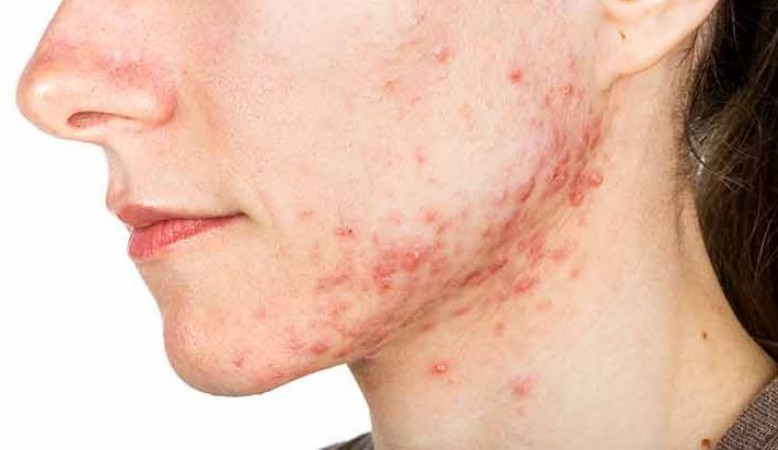
Skin problems often arise with changing weather conditions. Among the most common are acne, rashes, and pimples. These issues are frequently encountered and can affect individuals of all ages and skin types. While they may seem like minor inconveniences, they can impact one's confidence and overall well-being. It's essential to address these problems promptly and effectively.
While acne is a well-known skin concern, cystic acne presents a more severe and challenging condition. Cystic acne refers to deeply inflamed pimples that occur beneath the skin's surface. Unlike typical pimples, cystic acne lesions are filled with pus and form large, painful cysts. These can be particularly distressing and have a significant impact on one's quality of life.
Causes of Cystic Acne:
Understanding the underlying causes of cystic acne is crucial for effective treatment. Experts attribute the development of cystic acne to various factors, including hormonal fluctuations, genetics, diet, and lifestyle choices. One primary cause is the overproduction of oil (sebum) by the skin's sebaceous glands, which can clog pores and lead to inflammation. Additionally, the proliferation of bacteria within blocked pores exacerbates the condition, resulting in painful cystic lesions.
How to Treat Cystic Acne:
While cystic acne can be challenging to manage, several treatment options are available to alleviate symptoms and promote healing. It's essential to adopt a comprehensive approach that addresses both the underlying causes and visible symptoms of cystic acne. Natural remedies can complement conventional treatments and provide relief from discomfort and inflammation. Let's explore some effective remedies for managing cystic acne:
Apple Cider Vinegar:
Apple cider vinegar is renowned for its antibacterial and anti-inflammatory properties, making it a popular remedy for various skin conditions, including cystic acne. When diluted with water, apple cider vinegar can help balance the skin's pH levels, reduce inflammation, and inhibit the growth of acne-causing bacteria. To use apple cider vinegar as a topical treatment, mix one part vinegar with three parts water and apply it to the affected areas using a cotton pad or spray bottle. Allow it to sit for a few minutes before rinsing it off with lukewarm water. Incorporating apple cider vinegar into your skincare routine may help prevent and reduce the severity of cystic acne breakouts.
Ice Therapy:
Ice therapy, also known as cold therapy or cryotherapy, is a simple yet effective method for reducing inflammation and alleviating pain associated with cystic acne. The application of ice constricts blood vessels, reducing blood flow to the affected area and minimizing swelling and redness. Additionally, ice therapy numbs the nerve endings, providing temporary relief from discomfort and itching. To use ice therapy for cystic acne, wrap a few ice cubes in a clean cloth or towel and gently press it against the affected skin for 10-15 minutes. Repeat this process several times a day as needed to soothe inflamed cysts and promote healing.
Turmeric:
Turmeric, a golden-yellow spice derived from the Curcuma longa plant, has been used for centuries in traditional medicine for its potent anti-inflammatory and antioxidant properties. Curcumin, the active compound found in turmeric, exhibits antimicrobial activity and helps reduce inflammation by inhibiting the production of pro-inflammatory cytokines. Applying a turmeric paste to cystic acne lesions can help alleviate pain, swelling, and redness while promoting healing and preventing scarring. To prepare a turmeric paste, mix one teaspoon of turmeric powder with enough water or rose water to form a thick, smooth paste. Apply the paste to the affected areas and leave it on for 20-30 minutes before rinsing it off with lukewarm water. For best results, use this remedy regularly as part of your skincare routine.
Aloe Vera:
Aloe vera, a succulent plant species renowned for its soothing and healing properties, is a popular natural remedy for various skin conditions, including cystic acne. The gel-like substance found in aloe vera leaves contains bioactive compounds, such as polysaccharides, glycoproteins, and antioxidants, which exert anti-inflammatory, antimicrobial, and wound-healing effects. Applying aloe vera gel to cystic acne lesions can help reduce inflammation, soothe irritated skin, and promote faster healing. To use aloe vera for cystic acne, carefully extract the gel from an aloe vera leaf and apply it directly to the affected areas. Leave the gel on for 15-20 minutes before rinsing it off with lukewarm water. For optimal results, repeat this process twice daily until the acne resolves.
Seeking Professional Advice:
While natural remedies can be beneficial for managing cystic acne, severe or persistent cases may require medical intervention. Dermatologists and skincare experts possess the knowledge and expertise to diagnose and treat cystic acne effectively. They may recommend prescription medications, such as topical retinoids, oral antibiotics, or isotretinoin, to target the underlying causes of cystic acne and prevent future breakouts. Additionally, dermatologists can perform procedures like corticosteroid injections, acne surgery, or laser therapy to reduce inflammation, promote healing, and minimize scarring associated with cystic acne. If you're struggling with cystic acne, don't hesitate to seek professional advice and explore treatment options tailored to your individual needs and skin type.
Cystic acne is a challenging skin condition characterized by deeply inflamed, painful cysts that can have a significant impact on one's physical and emotional well-being. While managing cystic acne may require patience and persistence, adopting a holistic approach that combines natural remedies with professional guidance can help alleviate symptoms, promote healing, and restore confidence in your skin's appearance. By understanding the causes of cystic acne and exploring effective treatment options, you can take proactive steps towards achieving clearer, healthier skin and embracing your natural beauty.
Nature's Sweet Treat: How Dates Can Benefit Your Skin
These Cool Beverages Help Maintain Hydration Throughout Ramadan